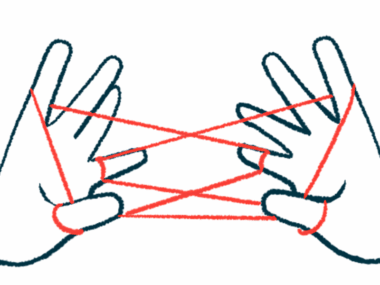Tiny words, big thoughts: How my Parkinson’s led to micrographia
As a constant list maker, I found it to be a hard symptom to accept
Written by |

One of the many annoying, frustrating, and mysterious symptoms of Parkinson’s disease is micrographia.
Micrographia is when your handwriting gets teeny-tiny and illegible over time. Like gait freezing, it’s one of those odd motor symptoms of Parkinson’s in which your mind knows what it wants to do, but the muscles in your body just can’t make it happen. The mind knows what legible handwriting is, and most “normal” people — even those with terrible handwriting — can form readable letters if they try. With micrographia, you just can’t. Your mind is thinking “big letters,” but your brain just won’t make the little illegible squiggles behave.
My handwriting was never spectacular, but I could make it clear and tidy if I paid attention. I took pride in handwriting all of my annual Christmas cards, and even my wedding invitations. But in the 11-plus years since I was diagnosed with Parkinson’s disease, that has all changed.
I’ve always been a list keeper and a planner. We used to joke in my family that it wasn’t a party until my clipboard, which was full of lists, made an appearance. I still have every day planner and to-do list notebook since middle school. My clipboard and lists are a defense against chaos. If it’s on the list, it will happen. If it’s not written down, it doesn’t exist. So what does it mean when I write something down but can’t read my writing anymore?
The writing on the wall
A few years ago, a good friend helped me reorganize my home office. She’s known me since seventh grade and has been on the receiving end of literally thousands of cards, letters, messages, and passed school notes from me. She was helping me sort through a stack of old notebooks and handed me two of them. One was from college, and the other was from about 2018, five years into my diagnosis. She noticed that my writing went from filling the space between the horizontal lines to going only halfway up. As I would write a sentence, we could both see the letters shrinking as the words trailed off at the end of a line.
I knew my handwriting was deteriorating, but to see the before and after in front of me like that was startling.
For many years since then, I’ve learned to make do with typed documents on my computer, and I’ve worked hard to make legible letters when I had to write something by hand. But about a year ago, I realized that I truly couldn’t rely on my handwriting anymore. If I need an envelope addressed, I have to ask my husband to do it. If I want to send a note of condolence or congratulations — sentiments that mean so much more when written by hand — I must type and print them. And my beloved to-do lists are now all electronic — and much less satisfying to cross off!
I’m learning to adapt to my nonhandwriting status. Technology has been an enormous help. Luckily, I still type pretty well, although that may be the next thing to go. Tools like transcriptions of Zoom meetings and artificial intelligence summaries of conversations have come in handy for work meetings. I carry a printout of all my medications and medical history because I can’t legibly fill out the forms at a doctor’s office. And I’m thankful every day for the Notes app on my phone, as well as the voice-to-text feature. I know these tools are helpful to people without Parkinson’s, too, but they can be especially handy when you have a condition like micrographia.
Losing my handwriting is just another small loss of who I was before Parkinson’s and another step toward who I am becoming.
Note: Parkinson’s News Today is strictly a news and information website about the disease. It does not provide medical advice, diagnosis, or treatment. This content is not intended to be a substitute for professional medical advice, diagnosis, or treatment. Always seek the advice of your physician or another qualified health provider with any questions you may have regarding a medical condition. Never disregard professional medical advice or delay in seeking it because of something you have read on this website. The opinions expressed in this column are not those of Parkinson’s News Today or its parent company, Bionews, and are intended to spark discussion about issues pertaining to Parkinson’s disease.




Linda Wegener
Loved this essay. My husband has same problem as you do. He’s 80 , diagnosed a year and a half. I do believe he’s had pd for a long time due to many other symptoms. He also is very OCD. The gift that keeps on giving we joke. Important to retain your sense of humor. Also hot weather makes his body feel better, FYI.
Lynne H Smith
Dear Mollie, It is so frustrating to lose the ability to write legibly.
I appreciate your descriptions of work arounds.
My writing improved a little from a LSVT Big program. On a good day I can print my name. The letters are wobbly but mostly legible. I print and use the movements that I practice.
Soon I won't be able to do this. Even my typing is a challenge because of double vision and shaky hands.
As you mention, voice to text is helps so much.
Jack Winover
Join the crowd.. Diagnosed in 2019 with atypical PD it occurred to me my writing had been very tiny fot at east 20 years prior.
Once diagnosed it all made sense…
Josie Nelson
It’s like a switch one on overnight! My voice is low, my thoughts are faster than my mouth, Micrographia, tremors on left side body. but on a good note, I stumbled on something that has helped me with constipation.”Liver Renew” Calls for 2 daily-I take 1 daily that works for me…. I’m taking he out for my liver…
Mike Farrell
I can relate. Before my Parkinson’s diagnosis 14 years ago, I found my handwriting deteriorating. Like you, I was never a great writer, but I prided myself on being an excellent note taker able to keep pace with an interview or presentation. This skill was especially important to me because as an attorney I relied on my note taking while interviewing and examining witnesses, negotiating labor contracts, conducting administrative hearings and doing other lawyer stuff. I became very frustrated with my condition, which I couldn’t explain. For over a year, I grew increasingly frustrated as I couldn’t keep up with witnesses as they spoke and often couldn’t read my own handwriting when it came time to review my notes. I became rather depressed as my inability continued without explanation. At first I blamed it on anxiety and seriously thought about changing professions, although I didn’t know what else I could do at 51 years old with no other skills and unable to write. I should have been in the prime of my career. The difficulty writing morphed into further coordination problems. My typing deteriorated, as did my speech. These problems increased my anxiety, which I now know fuels the Parkinson’s symptoms. This vicious cycle continued, undiagnosed for over a year, until I explained my difficulties to my primary care physician. She asked me to write a few words and symbols, which led eventually to my Parkinson’s diagnosis. Truthfully, I was relieved by the diagnosis. At least it explained what I had been experiencing. With great support from my colleagues, staff and friends, I was able to continue my career for over 10 years. I retired last year, a few years earlier than I had planned, because the disease progressed to the point I believed that providing the quality service that clients deserved was too taxing and exhausting. Everything is more difficult with Parkinson’s, but I cherish my family and am proud of my career, especially what I was able to accomplish despite Parkinson’s disease. I am thankful for the abilities that I have been able to maintain so far and try to make the best of every day.
Brian (@GrandPopBubbles) Maloney
Thanks for your comments. I, too, am a list maker with Parkinson's. I see my writing descending at times, and wonder what it will eventually come to.
Meanwhile, I hope my bubbles are never affected. --@GrandpopBubbles
max elsman
i was diagnosed 11 years ago, micrographia being one of my three initial symptoms. my left arm also stopped swinging when i walked and i developed a slight tremor in one hand. since then, my progression has slowed to a crawl. my arm began to swing again without treatment. such a strange disease. no two of us are alike. thank god i can still type.
Renee Le Verrier
Thank you for writing this. I feel like I could’ve done it. I’m a planner too and I do miss the list I could read. I still make them, tho! I’ve heard that graph paper can help with writing if you fill in up to the lines. I tried it. It works if you go slow enough. Thanks again!
Suzanne McGhie
Hi there
I have been horribly impacted by my non ability to write evenn a few legible words on our diary. But what concerns me more now is the s4eeming inability to ius3 my tablet properly. Does anybody here have an6 ptrractical tips for me to be able to write a decent email or a good message without wiping the whole message OT
R not being able to correct a word or a phrase whilst using an Android phone or a tablet. I wld b most grat4eful for any feedback on yhis. Suzanne mcghie